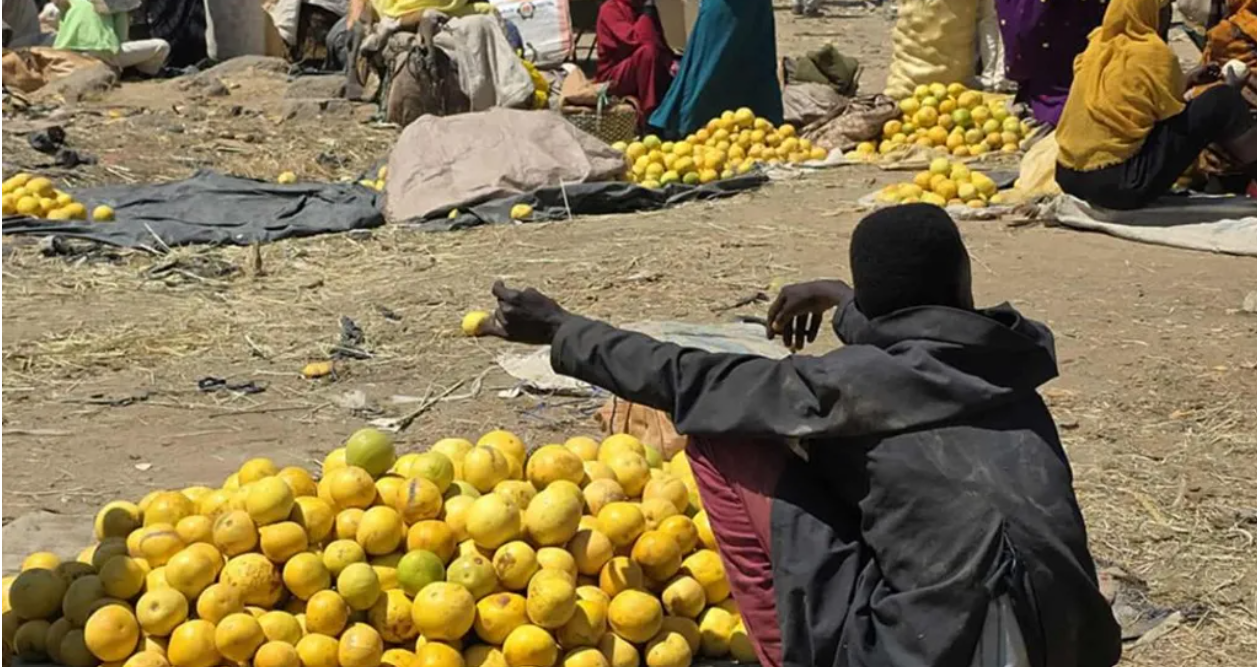

There is a place in Sudan where it is almost possible to forget that a devastating civil war is going on.
Wrapped in bright colours and wearing plastic sandals, women in the country's Jebel Marra mountains set off each morning on donkeys, children in tow, to tend the fields.
In a Mediterranean-like climate and using the fertile soil, they grow peanuts, oranges, apples and strawberries - rare crops for a country now facing one of the world's worst hunger crises. Before the conflict, Jebel Marra's organic oranges were particularly prized across the country for their juiciness.
The mountainous area in this part of the western Darfur region is dotted with green peaks, especially now as it is the rainy season.
The rest of Sudan teeters on the edge of disaster.
Across the country, as a result of the two-and-a-half years of fighting that has crippled agriculture, almost 25 million people - half the population - are facing severe food shortages, including more than 600,000 who are experiencing famine, according to the UN.
But in the lush highlands of Jebel Marra, the problem is not growing food – it is getting the produce out.
"We almost sell them for free and sometimes get rid of them on the way [to market], because they get rotten," says Hafiz Ali, an orange vendor in Golo town, which is in the midst of the mountains in Central Darfur state.
The insecurity and the poor state of the roads make transportation almost impossible.
Jebel Marra is the last remaining territory controlled by the Sudan Liberation Army - Abdulwahid (SLA-AW). This armed group has remained neutral in the current war. It has never signed a peace deal with the authorities in Khartoum going back to 2003 and the conflict over Darfur at that time.
SLA-AW has controlled what locals describe as "liberated areas" for more than two decades.
Now, surrounded by war on all sides, the region is increasingly isolated.
To the west and north, the Rapid Support Forces (RSF) and allied Arab militias have blocked major roads. To the south, RSF positions are bombed almost every week by the Sudanese army - these attacks are also claiming civilian lives.
The RSF also control areas to the east.
The result is a closed-off environment where farmers and middlemen can no longer reach the national markets in the cities of el-Fasher 130km (82 miles) away, or Tine, on the Chadian border, 275km (170 miles) away.
There are other alternatives but none have the same national reach and all involve treacherous journeys.
Tawila, right on the edge of SLA-AW territory, has become the site of a makeshift market. It is on the road to el-Fasher, which is cut off by an RSF siege, and has become home to tens of thousands who have managed to flee that city.
Because of the difficulty of moving the produce any further, there is an oversupply in the market and as a result prices here have fallen.
There are some here who are looking to buy supplies to try and smuggle produce into el-Fasher - an extremely dangerous and life-threatening trade.
Getting goods this far has always been a challenge and food can sometimes rot on the way.
"To travel about 12km, it takes you a whole day of driving in the mountains and the mud," says Yousif, a fruit vendor in Tawila. But now, he says, the insecurity makes things even worse.
In Central Darfur, a recent truce between leaders from the Fur ethnic group - dominant here - and Arab nomads has allowed limited trade in some areas.
Markets have reopened in the SLA-AW- controlled town of Nertiti, where Arab women sell sour milk and Fur farmers bring fruit and vegetables. But the arrangement is fragile.
"The market only opens once a week. Travel is still dangerous," says a trader from Nertiti.
"Armed robberies still happen on the roads, even after the agreement."
Fruit and crops can now also be sold in the market in RSF-controlled Zalingei, the capital of Central Darfur state. But Arab militias allied to the RSF are frequently accused of harassing or attacking civilians in the area, though the groups deny any wrongdoing.
Each Thursday, which is market day, the number of checkpoints between Nertiti and Zalingei increases, sometimes reaching more than two dozen. But as more vehicles are on the road on market days, more people take the opportunity to travel.
The checkpoints, some manned by RSF fighters and others by Arab militia, are sometimes overseen by just one armed man in plainclothes, who demands a fee. Drivers will then often try to negotiate as passengers watch on silently.
Returning back to the Jebel Marra region, SLA-AW checkpoints guard every road into the mountains, and armed men also demand money.
Bags are searched with contraband, even including skin-bleaching creams, widely used elsewhere in Sudan, are confiscated.
Once inside the SLA-AW controlled area, despite the relative peace, there are clear signs of the conflict elsewhere in the country.
Lorries filled with people fleeing the fighting, particularly around el-Fasher, can be seen on a daily basis.
Many of them find shelter in schools, clinics and other public spaces receiving little to no humanitarian assistance - aid agencies struggle to get through all the checkpoints.
In Golo, the de facto capital of the SLA-AW territory, a woman who had escaped from el-Fasher, described the dire conditions. She is now sheltering in a classroom with 25 other freshly arrived families.
"We have no income. No jobs to do, I used to work as a nurse and I can farm, but the land here belongs to people who work only for themselves. We don't know what to do," the woman said.
As she spoke, sick, elderly people lay on the ground and children were screaming from hunger. At least there will be some relief as the food that could not be taken out of Golo will be available.
This is the Jebel Marra region, a strange world surrounded by war. A world of green mountains and waterfalls. A world of bright, juicy fruit. A world of frightened evacuees.
One fruit trader said he had lost hope in both warring parties.
"We're not part of the war - we just want to sell our oranges."














